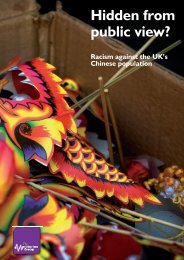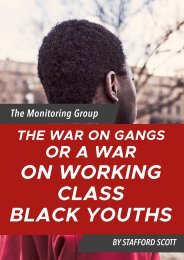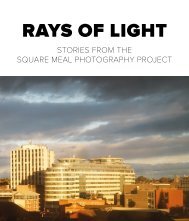Coming of Age : 1976 and the Road to Anti-Racism
Coming of Age : 1976 and the Road to Anti-Racism by Jagdish Patel and Suresh Grover
Coming of Age : 1976 and the Road to Anti-Racism
by Jagdish Patel and Suresh Grover
You also want an ePaper? Increase the reach of your titles
YUMPU automatically turns print PDFs into web optimized ePapers that Google loves.
lentlessly persecuted its owner. Frank Critchlow. They made it <strong>the</strong> test <strong>of</strong> police power; <strong>the</strong> blacks made<br />
it a symbol <strong>of</strong> resistance. The battle <strong>of</strong> <strong>the</strong> blacks <strong>and</strong> <strong>the</strong> police would be fought over <strong>the</strong> Mangrove.<br />
The trial <strong>of</strong> <strong>the</strong> Mangrove 9 (Oc<strong>to</strong>ber-December 1971) is <strong>to</strong>o well documented <strong>to</strong> be recounted here, but, briefly,<br />
<strong>the</strong>y won. They did more: <strong>the</strong>y <strong>to</strong>ok on what <strong>the</strong> defence counsel called ‘naked judicial tyranny’ — some by conducting<br />
<strong>the</strong>ir own defence — <strong>and</strong> won. Above all, <strong>the</strong>y unfolded before <strong>the</strong> nation <strong>the</strong> corruption <strong>of</strong> <strong>the</strong> police<br />
force, <strong>the</strong> bias <strong>of</strong> <strong>the</strong> judicial system, <strong>the</strong> racism <strong>of</strong> <strong>the</strong> media — <strong>and</strong> <strong>the</strong> refusal <strong>of</strong> black people <strong>to</strong> submit <strong>the</strong>mselves<br />
<strong>to</strong> <strong>the</strong> tyrannies <strong>of</strong> <strong>the</strong> state. O<strong>the</strong>r trials would follow <strong>and</strong> even more bizarre prosecutions be brought, as<br />
when <strong>the</strong> alleged edi<strong>to</strong>r <strong>of</strong> Grassroots was charged with ‘encouraging <strong>the</strong> murder <strong>of</strong> person’s unknown’ by reprinting<br />
an article from <strong>the</strong> freely available American Black Pan<strong>the</strong>r paper on how <strong>to</strong> make Molo<strong>to</strong>v cocktails. But<br />
<strong>the</strong>y would all be defended — by <strong>the</strong> whole community — <strong>and</strong> become ano<strong>the</strong>r school <strong>of</strong> political education. (41)<br />
If <strong>the</strong> Mangrove marked <strong>the</strong> high water-mark <strong>of</strong> Black Power <strong>and</strong> lowered <strong>the</strong> threshold <strong>of</strong> what black people<br />
would take, it also marked <strong>the</strong> beginnings <strong>of</strong> ano<strong>the</strong>r resistance: <strong>of</strong> black youth condemned by racism <strong>to</strong><br />
<strong>the</strong> margins <strong>of</strong> existence <strong>and</strong> <strong>the</strong>n put upon by <strong>the</strong> police. Sus had always laid <strong>the</strong>m open <strong>to</strong> police harassment,<br />
but <strong>the</strong> government’s White Paper on Police-Immigrant Relations in 1973, which warned <strong>of</strong> ‘a small minority <strong>of</strong><br />
young coloured people... anxious <strong>to</strong> imitate behaviour amongst <strong>the</strong> black community in <strong>the</strong> United States’, put<br />
<strong>the</strong> government’s imprimatur on police behaviour. The previous year <strong>the</strong> press <strong>and</strong> <strong>the</strong> police had discovered a<br />
frightening new strain <strong>of</strong> crime’ <strong>and</strong> ‘mugging’ was added <strong>to</strong> Sus’ as an <strong>of</strong>fence on which <strong>the</strong> police could go<br />
on <strong>the</strong> <strong>of</strong>fensive against West Indian youth. (42) The courts had already nodded <strong>the</strong>ir approval— by way <strong>of</strong> an<br />
exemplary twenty-year sentence passed on a 16-year-old ‘mugger’. From <strong>the</strong>n on, <strong>the</strong> lives <strong>of</strong> black youths<br />
in <strong>the</strong> cities <strong>of</strong> Britain were subject <strong>to</strong> increased pressure. Their clubs were attacked on one pretext or ano<strong>the</strong>r<br />
<strong>the</strong>ir meeting places raided <strong>and</strong> <strong>the</strong>ir events - carnivals, bonfires, parties – blanketed by police presence. Black<br />
youths could not walk <strong>the</strong> streets outside <strong>the</strong> ghet<strong>to</strong> or hang around streets within it without courting arrest. And<br />
apart from individual arrests, whole communities were subjected <strong>to</strong> road blocks, s<strong>to</strong>p <strong>and</strong> search <strong>and</strong> mass arrests.<br />
In Brix<strong>to</strong>n in 1975 <strong>the</strong> para-military Special Patrol Group (SPG) cruised <strong>the</strong> streets in force, made arbitrary<br />
arrests <strong>and</strong> generally terrorised <strong>the</strong> community. In Lewisham, <strong>the</strong> same year, <strong>the</strong> SPG s<strong>to</strong>pped 14.000 people on<br />
<strong>the</strong> streets <strong>and</strong> made 400 arrests. The pattern was repeated by similar police units in o<strong>the</strong>r parts <strong>of</strong> <strong>the</strong> country.<br />
The youth struck back <strong>and</strong> <strong>the</strong> community closed behind <strong>the</strong>m at Brockwell Park fair in 1973, for instance, <strong>and</strong> at <strong>the</strong><br />
Carib Club (1974) <strong>and</strong> in Chapel<strong>to</strong>wn, Leeds, on bonfire night (1975), <strong>and</strong> finally exploded in<strong>to</strong> direct confrontation, with<br />
bricks <strong>and</strong> bottles <strong>and</strong> burning <strong>of</strong> police cars., at <strong>the</strong> Notting Hill Carnival <strong>of</strong> <strong>1976</strong> — when 1,600 policemen <strong>to</strong>ok it on<br />
<strong>the</strong>mselves <strong>to</strong> kill joy on <strong>the</strong> streets. Clearly <strong>the</strong> politics <strong>of</strong> <strong>the</strong> stick had not paid <strong>of</strong>f — or perhaps needed <strong>to</strong> be stepped<br />
up <strong>to</strong> be really effective. But by now a Labour government was in power <strong>and</strong> <strong>the</strong> emphasis shifted <strong>to</strong> social control.<br />
Meanwhile, <strong>the</strong> struggles in <strong>the</strong> workplace were throwing up ‘ano<strong>the</strong>r community, a community <strong>of</strong> black class interests<br />
— linking <strong>the</strong> shop-floor battles <strong>of</strong> Pakistanis. Indians <strong>and</strong> West Indians, sometimes directly through roving strike<br />
committees, sometimes through black political organisations, while combating at <strong>the</strong> same time <strong>the</strong> racism <strong>of</strong> <strong>the</strong><br />
trade unions, from within <strong>the</strong>ir ranks. Where <strong>the</strong>y were not unionised, black workers first used <strong>the</strong> unions, who were<br />
rarely loth <strong>to</strong> increase unionisation – <strong>and</strong> <strong>the</strong>n <strong>to</strong>ok on <strong>the</strong> racism <strong>of</strong> <strong>the</strong> unions <strong>the</strong>mselves. Unions, after all, were <strong>the</strong><br />
organisations <strong>of</strong> <strong>the</strong>ir class <strong>and</strong>, however vital <strong>the</strong>ir struggles as blacks, <strong>to</strong> remain a people apart, would be <strong>to</strong> set back<br />
<strong>Coming</strong> <strong>of</strong> <strong>Age</strong> | 55<br />
<strong>Coming</strong> <strong>of</strong> <strong>Age</strong> Final version 16.10.indd 55 17/10/2017 12:07







